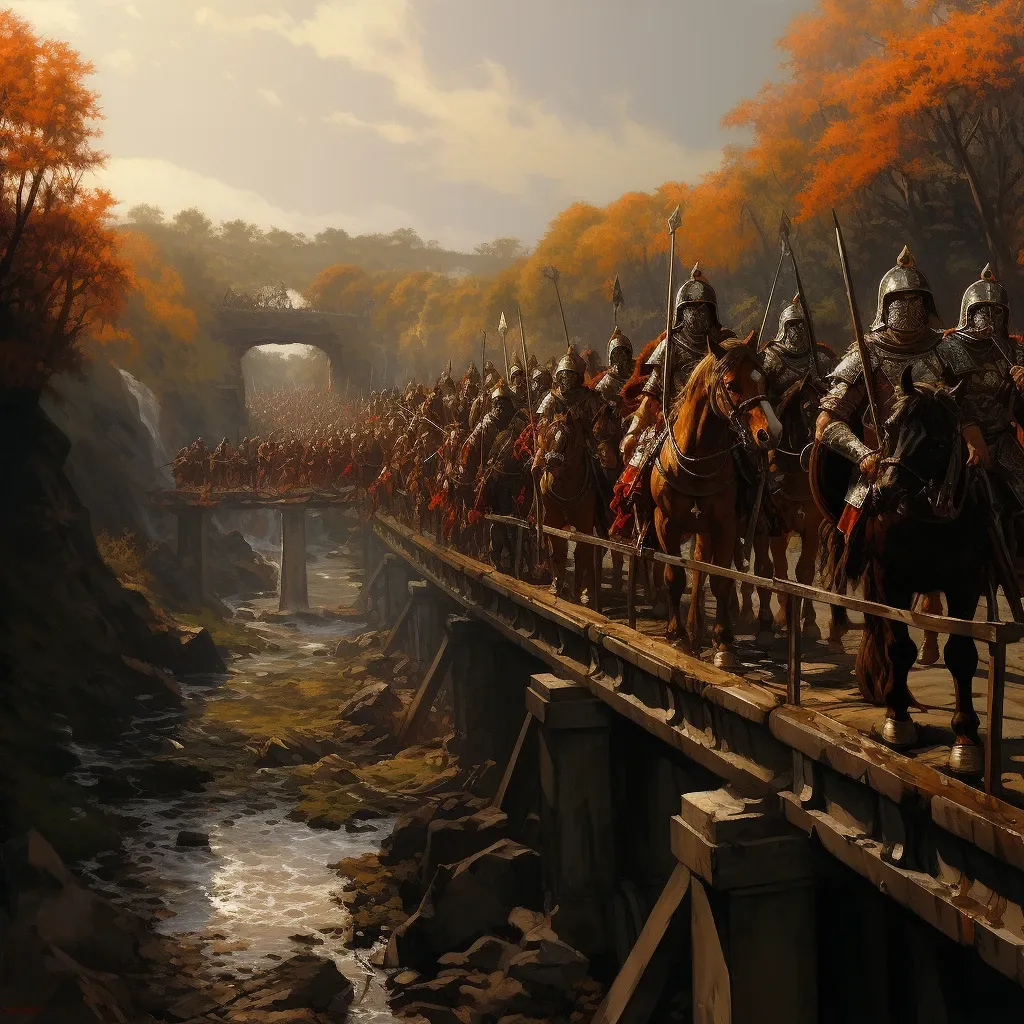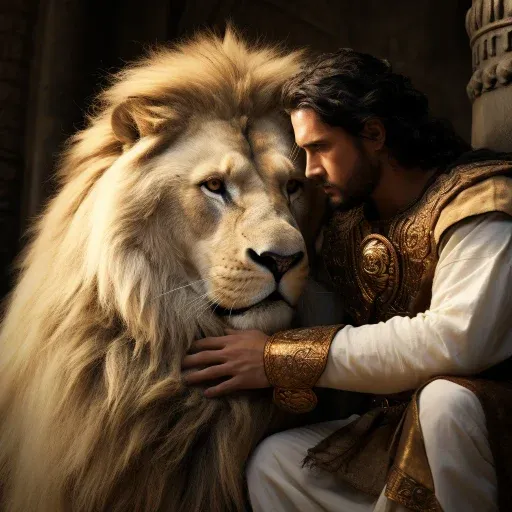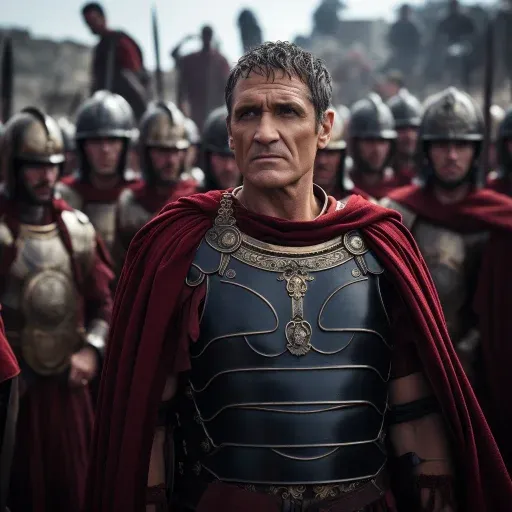BY JAMES BALDWIN
Horatius at the Bridge
Famous Stories Retold: Story 28 of 50

Heading

Symbol of Courage: His bravery allowed Rome to remain safe from the invaders, becoming a symbol of Roman valor.
Legendary Status: The story of Horatius has been immortalized in Roman lore and serves as an example of self-sacrifice and heroism.
A good book we like, we explorers. That is our best amusement, and our best time killer
- Roald Amundsen, Explorer
Horatius at the Bridge: A Glimpse of Heroism
Step into ancient Rome, where tales of courage, loyalty, and sacrifice echo through the ages. Among them, the legendary feat of Horatius at the Bridge stands unmatched, a testament to the fearless spirit of Rome's defenders. As we look into this saga, expect to be fascinated by a story that encapsulates the essence of heroism, and provides a fascinating glimpse into the Rome of yore. Prepare to be inspired and awed by the determined valor of a single man, who stood against an army to safeguard his beloved city.
The Impending War: Porsena's Army Approaches Rome
In the annals of Rome, a time came when its very existence was threatened by the mighty Etruscans. Their King, Porsena, had assembled an imposing army and started his march towards Rome with a grim determination. As the Etruscan army, a sea of horsemen and footmen, crested the hills to the north, the citizens of Rome found themselves gazing at their possible doom. The wooden bridge across the Tiber river was all that stood between the Etruscans and Rome. This bridge would become the stage for an extraordinary act of bravery that would echo through Roman history.
A Critical Decision: The Roman Fathers' Dilemma
The Roman Fathers, the venerable lawmakers of Rome, were faced with a grave dilemma. If the Etruscan army crossed the bridge, Rome would be at their mercy. The Romans, being fewer in numbers, knew they could not confront the Etruscans on an open battlefield. The city's defenses were fortified, but the impending danger was real. Faced with this strategic nightmare, the Roman Fathers were at a loss for a solution. It was at this critical juncture that a man named Horatius emerged from the ranks of the Roman guards.
Podcast
Horatius: The Brave Guard at the Bridge
Horatius, a guard at the bridge and a man of remarkable courage, took up the daunting task of defending his city. Positioned on the far side of the river, he could see the Etruscan forces drawing near. Calling out to his fellow Romans, he commanded them to chop down the bridge with all the haste they could muster. With just two men by his side, Horatius confronted the approaching enemy forces. Armed with their shields and long spears, they held their ground, determined to keep the enemy at bay while their compatriots worked on dismantling the bridge.
A Daring Stand: Horatius and His Companions' Defense
As the Etruscan army advanced, it was Horatius who made a stand. He was not alone in his brave endeavor, for two comrades stood by his side. Together they formed a human barricade, their shields before them, and their long spears poised for battle. Their mission was not to defeat the enemy, but to keep them at bay while the Romans worked tirelessly to dismantle the bridge. Porsena's horsemen charged, but they were met with the unwavering courage of Horatius and his companions. Their bold stand allowed the Romans the time they needed, saving the city from imminent capture.

The Heroic Leap: Horatius' Brave Act
Just as the bridge teetered on the brink of collapse, Horatius made his final stand. His companions had retreated, but he remained, a solitary figure against the approaching enemy. He showed no fear, no hesitation as a dart from the enemy struck his left eye. Instead, he threw his spear at the foremost horseman and then, in an act of unparalleled bravery, leapt into the Tiber River. Despite being weighed down by his heavy armor, Horatius, the best swimmer in Rome, surfaced and swam to safety, evading the spears and darts hurled after him. His heroic leap not only saved his life but also ensured the city's safety.
Aftermath and Recognition: Roman Gratitude towards Horatius
In the aftermath of the battle, gratitude towards Horatius resonated throughout Rome. The city he had saved lauded him as a hero. Despite losing an eye, he gained a name - Horatius Cocles or 'one-eyed Horatius'. His bravery was immortalized in a fine brass statue, and he was gifted as much land as he could plow in a day. His tale was told and retold, a testament to his courage and a reminder of his heroic deed. "With weeping and with laughter, the story was still told, How well Horatius kept the bridge in the brave days of old."
In the annals of human courage, Horatius at the Bridge encapsulates the essence of heroism. His valorous stand, despite overwhelming odds, is a testament to the indomitable spirit of Rome's defenders. His daring leap into the Tiber underscores the depth of his commitment to safeguard his beloved city. Undeniably, his story echoes through the centuries, reminding us of the sacrifices made by individuals for the greater good. This tale of bravery and Roman history, etched with weeping and laughter, continues to inspire, reminding us of the heroic deeds that helped shape the Rome of yesteryear.





